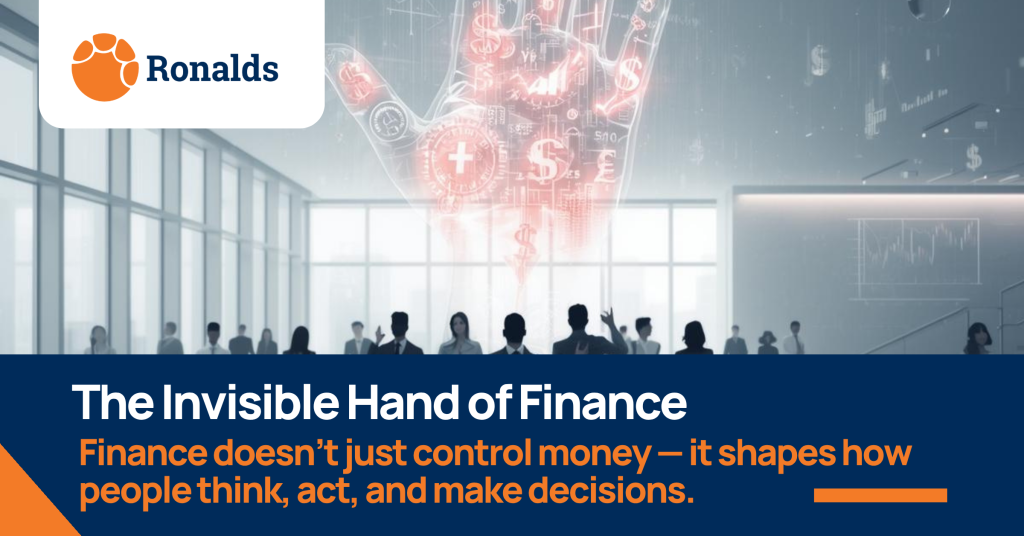By Ronalds Africa | VUCA Finance Leaders Forum Series
The Currency You Can’t Record on a Balance Sheet
In every boardroom, decisions are made on the foundation of one invisible asset — trust.
It doesn’t appear on the balance sheet, yet it determines the credibility of every report, the weight of every recommendation, and the voice of every finance leader.
Many finance professionals walk into meetings with impeccable numbers, yet leave without impact. They are heard, but not heeded. Their reports are received, but rarely acted upon.
This is the trust deficit — a silent gap that separates technical competence from true influence.
1. The First Fracture: When Numbers Speak but Don’t Connect
Trust is not built on precision — it’s built on clarity and connection.
Boards don’t need more data; they need insight. They seek to understand not only what happened but what it means — and what should happen next.
However, many finance leaders still communicate in technical terms, drowning the board in detail without a clear strategic message.
“Boards don’t need more numbers. They need better conversations.”
Board’s Expectation vs. Finance Leader’s Reality
| Board’s Expectation | Finance Leader’s Reality |
|---|---|
| Strategic interpretation of financial data | Overload of financial detail |
| Clarity on risks, opportunities, and strategy | Focus on compliance and reporting |
| Visionary financial leadership | Transactional information delivery |
A finance leader’s first responsibility in the boardroom is to translate — not just report.
2. The “Department of No” Dilemma
For too long, finance teams have been seen as the “Department of No” — the voice that cuts budgets, slows down projects, and resists risk.
This culture of caution, though rooted in responsibility, often erodes trust. It positions finance as a barrier rather than a business enabler.
Modern finance leaders must evolve from gatekeepers to strategic partners — balancing prudence with possibility.
“A trusted CFO is not the keeper of caution — but the architect of clarity.”
3. Emotional Intelligence: The Missing Competency
In today’s boardrooms, emotional intelligence (EQ) has become as critical as technical expertise.
Finance leaders who understand personalities, read the room, and communicate with empathy create alignment — not resistance.
EQ enables finance leaders to present difficult truths without defensiveness, to challenge assumptions without confrontation, and to build confidence through composure.
The most influential CFOs combine logic with empathy — connecting through numbers and relationships alike.
4. From Competence to Conviction
Competence earns respect; conviction earns influence.
Boards value accuracy, but they follow confidence. The most trusted finance leaders do not simply say, “Here’s what the data shows.”
They say, “Here’s what we should do next — and here’s why.”
That shift — from reporting to recommending — transforms finance managers into strategic advisors.
The 3 Pillars of Boardroom Trust
| Pillar | Focus | Action |
|---|---|---|
| Clarity | Simplify complexity | Present insights in decision-ready formats |
| Confidence | Inspire trust through conviction | Back analysis with actionable recommendations |
| Connection | Build relational credibility | Speak in the board’s language — strategy, risk, growth |
5. The Hidden Cost of a Trust Deficit
When trust breaks, the consequences ripple across the organisation.
The Hidden Costs of a Trust Deficit
| Consequence | Impact |
|---|---|
| Misaligned strategy | Financial insights fail to shape decisions |
| Decision paralysis | Over-analysis replaces execution |
| Diminished influence | CFO’s role reduced to compliance |
| Organisational risk | Poor anticipation of financial threats |
| Leadership tension | Fragmented communication and eroded morale |
Trust, once lost, silently compounds — affecting not only performance but culture itself.
6. Rebuilding Trust in the VUCA Era
In a world defined by volatility, uncertainty, complexity, and ambiguity (VUCA), the boardroom’s most trusted ally must be its finance leader.
Rebuilding trust starts with:
✅ Translating data into clarity
✅ Aligning financial insight with strategic priorities
✅ Communicating with confidence and empathy
✅ Leading with purpose — not procedure
At Ronalds Africa, we believe finance leadership is not about controlling the narrative — it’s about clarifying it.
Conclusion: The Real Balance Sheet of Leadership
The measure of a finance leader’s success is no longer limited to financial control — but to strategic credibility.
When CFOs earn trust, they move from recorders of results to architects of resilience.
Because at the heart of every great organisation lies one truth:
“Trust is the real balance sheet of leadership — and the most strategic finance leaders know how to keep it in surplus.”
Join the VUCA Finance Leaders Forum
Join us in Naivasha as we unpack the evolving role of finance leaders — from controllers of compliance to creators of value.
📅 4th–7th November 2025
🏨 Sopa Lodges, Naivasha
🔗 Register now: https://forms.gle/w1G9uvdGoVKwQifU6




